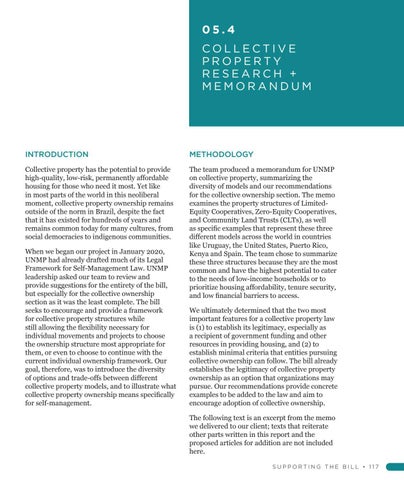05.4 COLLECTIVE PROPERTY RESEARCH + MEMORANDUM
INTRODUCTION
METHODOLOGY
Collective property has the potential to provide high-quality, low-risk, permanently affordable housing for those who need it most. Yet like in most parts of the world in this neoliberal moment, collective property ownership remains outside of the norm in Brazil, despite the fact that it has existed for hundreds of years and remains common today for many cultures, from social democracies to indigenous communities.
The team produced a memorandum for UNMP on collective property, summarizing the diversity of models and our recommendations for the collective ownership section. The memo examines the property structures of LimitedEquity Cooperatives, Zero-Equity Cooperatives, and Community Land Trusts (CLTs), as well as specific examples that represent these three different models across the world in countries like Uruguay, the United States, Puerto Rico, Kenya and Spain. The team chose to summarize these three structures because they are the most common and have the highest potential to cater to the needs of low-income households or to prioritize housing affordability, tenure security, and low financial barriers to access.
When we began our project in January 2020, UNMP had already drafted much of its Legal Framework for Self-Management Law. UNMP leadership asked our team to review and provide suggestions for the entirety of the bill, but especially for the collective ownership section as it was the least complete. The bill seeks to encourage and provide a framework for collective property structures while still allowing the flexibility necessary for individual movements and projects to choose the ownership structure most appropriate for them, or even to choose to continue with the current individual ownership framework. Our goal, therefore, was to introduce the diversity of options and trade-offs between different collective property models, and to illustrate what collective property ownership means specifically for self-management.
We ultimately determined that the two most important features for a collective property law is (1) to establish its legitimacy, especially as a recipient of government funding and other resources in providing housing, and (2) to establish minimal criteria that entities pursuing collective ownership can follow. The bill already establishes the legitimacy of collective property ownership as an option that organizations may pursue. Our recommendations provide concrete examples to be added to the law and aim to encourage adoption of collective ownership. The following text is an excerpt from the memo we delivered to our client; texts that reiterate other parts written in this report and the proposed articles for addition are not included here. SUPPORTING THE BILL • 117













